Client-Centric Manufacturing: Perspectives and Insights From Across the Industry
As a strategic digital marketing agency, we are constantly striving to understand the needs and challenges faced by the industries we serve. We recently partnered with a research organization to learn more about the manufacturing industry straight from manufacturing professionals.
In this blog, we’ll take you through the key findings of our research, shedding light on what manufacturers really expect of their vendors. From supply chain disruptions to talent recruitment to profitability concerns, we’ll explore the pressing issues facing manufacturers today and offer actionable insights for vendors looking to better serve their clients.
Join us as we dive into the data, uncover trends, and provide actionable insights for manufacturers and vendors alike. Let’s explore how strategic partnerships and customer-centric approaches can drive success in this essential industry.
About the Research and Survey Respondents
Keystone Click partnered with an independent research organization to develop this attitudinal survey and manage the fielding from September 1 to October 21, 2023. Our goals for the survey were to understand how manufacturers are feeling, what they’re struggling with, and how the manufacturing industry has changed since the COVID-19 pandemic. We want to share the results and insights to help manufacturing professionals and businesses that partner with manufacturers add value by meeting their expressed needs.
Confidence in the Results
The group outreach efforts garnered 40 verified respondents, which is the equivalent of 4 focus groups. The independent research organization reported a margin of error of +/- 15.5 percentage points at a 95% confidence level, which means 95% of the time, repeating the study would generate results within 15.5 percentage points of the results reported.
Survey Partners
To reach more manufacturing professionals and improve the representativeness of the data, Keystone Click partnered with manufacturing eCommerce strategist B2B Tail, printing and mailing service provider McAdams Graphics, the Texas chapter of the professional trade association Women in Manufacturing, and the nation’s oldest and largest compiler of industrial information Manufacturers’ News, Inc. (MNI).
Survey Respondents’ Demographics

To qualify for the survey, manufacturing professionals had to play a role in their organization’s buying process.
Respondents were allowed to choose multiple business operations to describe their roles within their respective organizations. Management, Marketing, and Sales were selected by 49% of respondents. The majority of respondents had decision-making power within their organizations: 85% were in a management position or higher.
In terms of age, 52.5% were in their 30s, 40s, or 50s. Those in their 30s and early 40s fall into the Millennial Generation, which is becoming the dominant generation in the workforce as Baby Boomers retire.
Survey Respondents’ Organizations
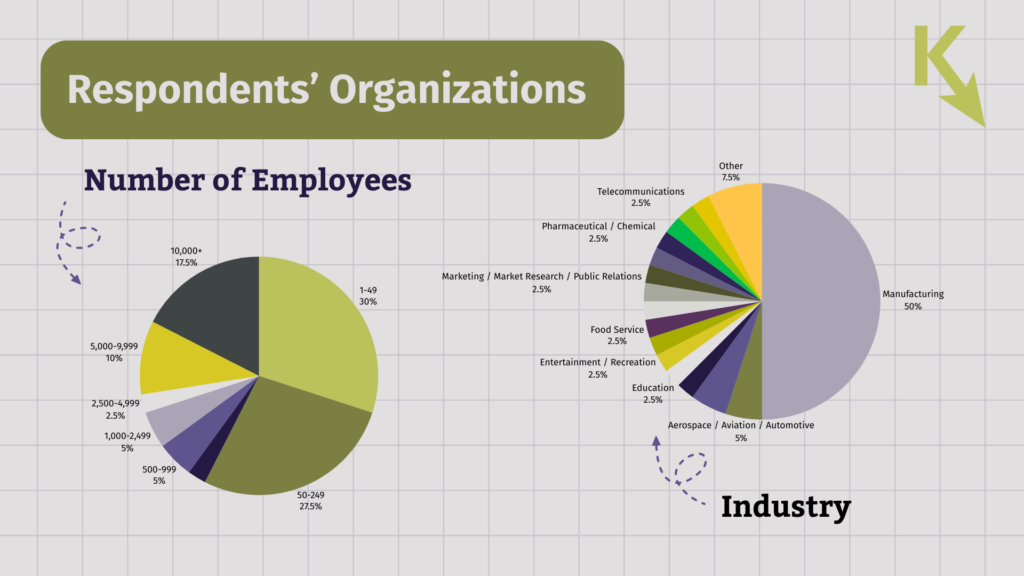
When we look at the respondents’ organizations, 30% are considered small businesses with 1-49 employees; 27.5% are small-to-medium-sized businesses (SMB), and, interestingly, 17.5% are very large corporations with 10,000 or more employees.
Respondents could select from a list of 35 industries to further describe the primary operation of their organizations. Half of the respondents selected “Manufacturing,” with the remaining 50% split between sub-industries ranging from Aerospace/Aviation/Automotive to Wholesale.
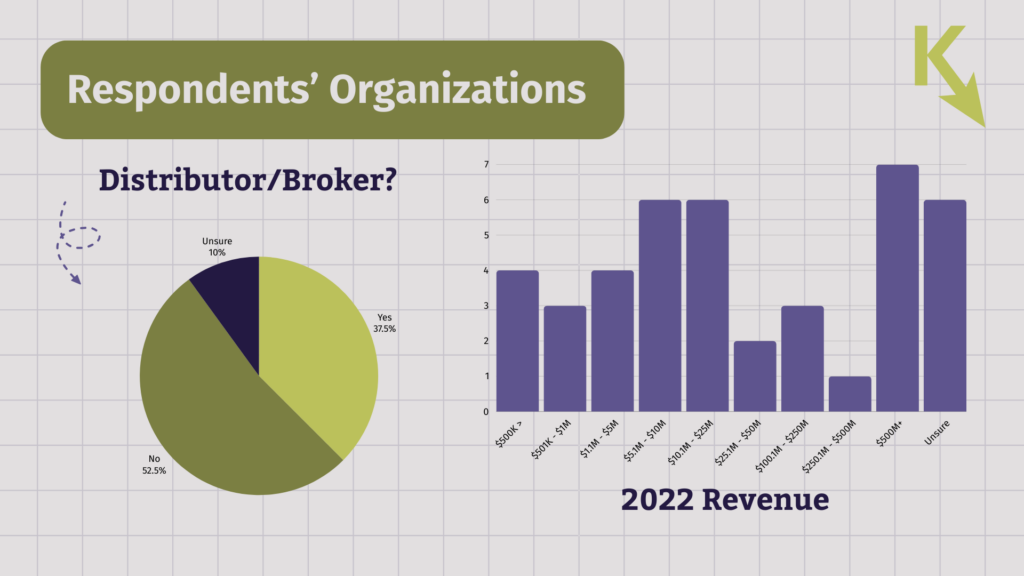
Just over half of respondents are with organizations that are original equipment manufacturers (OEMs). They are manufacturers likely selling directly to another business and/or selling through partners like distributors or manufacturer representatives.
Because the survey was fielded in the fall of 2023, respondents were asked to report on 2022 revenue. Based on revenue, their organizations ranged from micro-enterprises to conglomerates; however, the majority were medium- to large-sized businesses.
Unveiling Key Research Findings
Now that we understand the survey methodology, respondents’ demographics, and the makeup of respondents’ organizations, let’s dive into the data to discover what manufacturers expect from vendors based on their attitudes and what they say their top challenges are.
Manufacturers’ Expectations
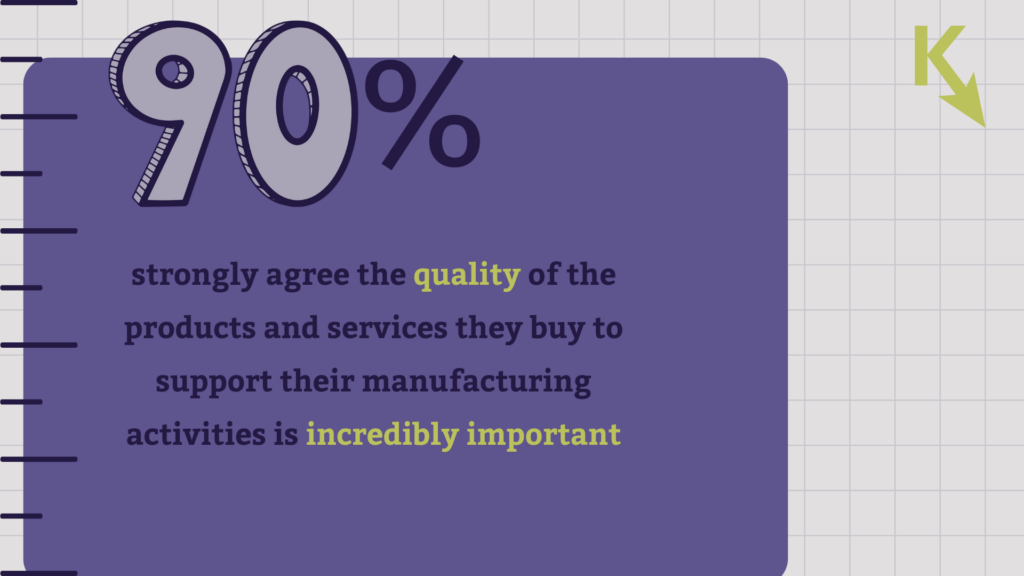
Nearly all respondents – 90% – strongly agree that the quality of the products and services they buy to support their manufacturing activities is incredibly important.
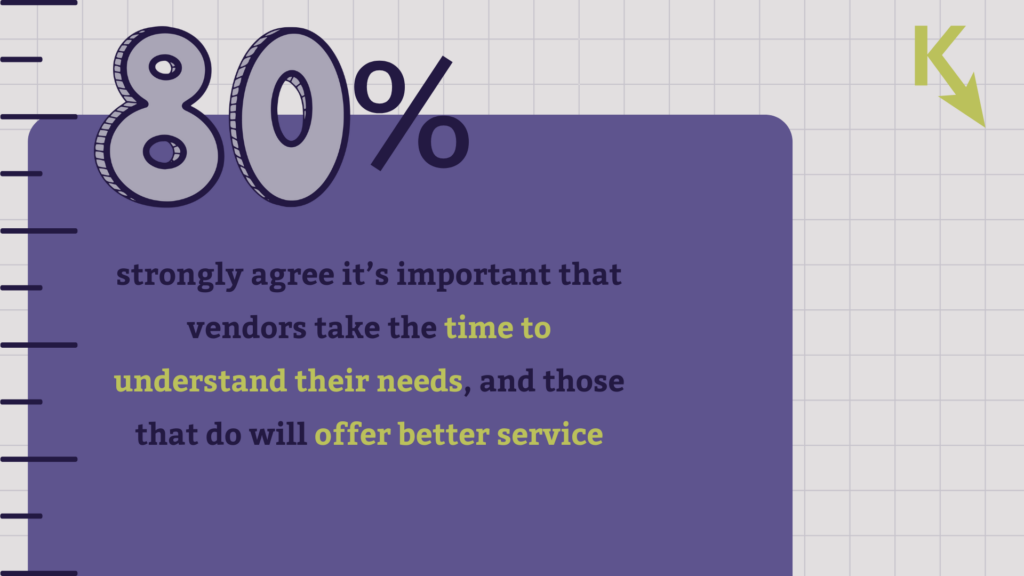
A theme we saw throughout the data was the importance of vendor/manufacturer relationships, and this data point is an example of that. Eighty percent strongly agree it’s important that vendors take the time to understand their needs, and those that do will offer better service.
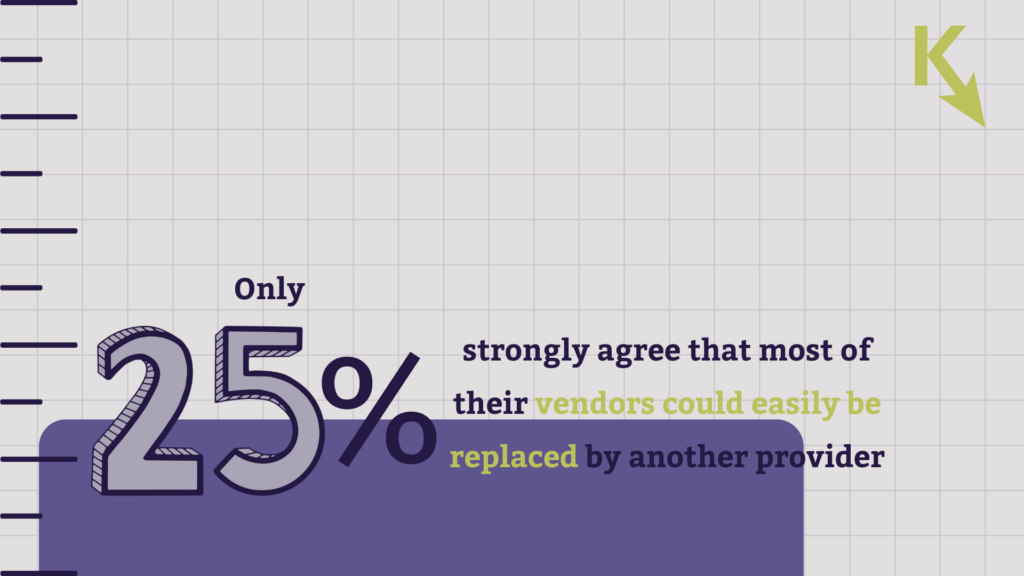
One-quarter of respondents strongly agree that most of their vendors could easily be replaced by another vendor.
Insights
These three data points indicated to us the importance manufacturers place on vendor quality and customer-centricity and also the challenge that switching vendors presents.
- Quality – Unsurprisingly, quality is of the utmost importance to manufacturers. Tied into that are vendor reliability, consistency, and performance, which are also critical.
- Customer-centricity – It can’t be understated how important it is for vendors to intentionally build relationships with their manufacturing clients and be customer-focused in all their communication.
- Vendor loyalty – Manufacturers are loyal to their vendors in part because it is difficult to replace them. Why? Their vendors may have unique offerings, or the manufacturers may not be aware of their vendor options. Understanding they are not easily replaceable should lead vendors to position themselves as the experts while building strong relationships and maintaining product quality.
Actions
What do these insights mean for you as a vendor?
- Don’t use quality as a differentiator – Most if not all manufacturers would say that they produce a quality product. Quality is of course important, but it’s expected. How can you differentiate yourself above and beyond quality?
- Invest in relationships – Put more time and energy into building your vendor/manufacturing relationships and offering tailored services or solutions to your ideal customer to differentiate yourself. Go beyond transactional conversations: take the time to listen and understand their pains. Embed yourself within the organization by connecting and building relationships with more people in a variety of roles. This can serve you well if your primary contact changes roles or leaves the organization or if there’s a change in company leadership; your strong bonds will make transitions smoother and create allies who will advocate for you as the premium vendor.
- Understand the customer journey – Know the process your ideal customers take to make a buying decision and educate them to help them choose you. This can include content (blogs, videos, podcasts, email, and newsletters, consulting, training, and tech support. Educating and adding value throughout the customer journey enhances your value proposition and can speed up the sales process because you’ve established trust and nurtured the customer.
Manufacturers’ Top 3 Challenges
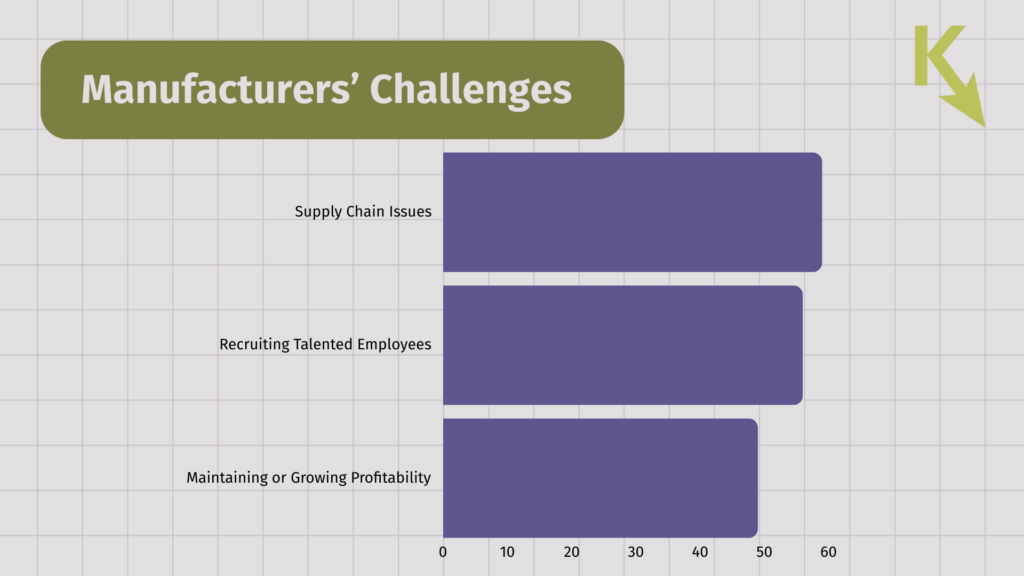
The COVID-19 pandemic was a challenging time for individuals and businesses. As we all work to adjust to the “new normal,” manufacturers continue to struggle with supply chain issues, recruiting talented employees, and maintaining or growing profitability.
Supply Chain Issues
The effects of manufacturing and shipping disruptions during the pandemic rippled across the globe and brought the supply chain to our collective awareness. Though the upheaval has lessened, manufacturers still face production delays and operational uncertainty.
Insights
Manufacturers place significant importance on efficiency and speed. Continued supply chain issues indicate a need for streamlined processes, reduced lead times, and agile supply chain management processes.
Actions
If you deliver with a quick turnaround time, ensure that your current and ideal customers know that. Fast delivery from you can improve your customer’s delivery time to their customer – include that in your marketing messaging.
If you provide products or services related to supply chain management that can address the supply chain pains, consider how you can rethink your marketing to reach the manufacturers who need your help.
Recruiting Talented Employees
When it comes to recruiting, human resource (HR) management is a key concern. Thirty percent of respondents are with organizations that have 49 or fewer employees; organizations of this size may not have a dedicated HR department. Resource constraints and a lack of HR specialists make addressing complex HR challenges like recruitment more challenging.
The aging workforce and labor shortages have been a concern for manufacturers since before the pandemic. The skills gap and misconceptions about the industry make finding and retaining talent more difficult.
Insights
The manufacturing industry as a whole would benefit from a rebrand. To reach the younger generations, manufacturers also need actionable strategies for developing and retaining talent and keeping up with changing workplace expectations.
Actions
Manufacturing companies and individual professionals can partner with professional organizations to improve the perception of the industry. By emphasizing the value manufacturers provide to society and the economy and showcasing modern facilities and new technologies, they can help craft a new, more accurate image of the industry. This would help attract talent from outside of the industry and inspire the up-and-coming generations to consider career paths in manufacturing. Thought leaders like Meaghan Ziemba from Mavens in Manufacturing, Drew Crowe from The New American Manufacturing Rennaisance, and Jake Hall, The Manufacturing Millennial, are all doing groundbreaking work to change the narrative.
Manufacturers can connect with their local manufacturing extension partnership (MEP) center or programs like Apprenticeship USA to begin an apprenticeship program or workforce development assistance.
Employment perks such as professional organization memberships can be mutually beneficial. Corporate membership to Women in Manufacturing, for example, gives all employees, not just women, access to chapter programming, virtual learning opportunities, conferences, and more. The education, upskilling, and networking opportunities can help retain and attract employees.
What we have seen in marketing is a shift from attracting new business opportunities to attracting new talent. If you want to grow your talent base, consider paying more attention to the Career section of your website. Add and update webpages to showcase your company culture, benefits, milestones, and employee reviews to position yourself as a preferred employer.
Vendors providing services and resources around talent recruitment, retention, training, etc. are needed to help manufacturers work through these challenges.
Maintaining or Growing Profitability
Given rising inflation and recession concerns, it was no surprise to us that profitability was a top challenge for manufacturers.
Insights
Even under ideal economic conditions, increasing revenue and managing costs will be important to manufacturers. Of interest to them are help with process and production optimization, lowering expenses, lean manufacturing methodologies, and cost-effective technologies.
Actions
Manufacturing professionals can add value to their organizations by educating themselves on these topics (by pursuing Lean Six Sigma certification, for example) and applying what they learn at work.
For vendors with products or services related to creating efficiencies or reducing costs, messaging about saving money and enhancing efficiency will help capture manufacturers’ attention.
Here’s a real-life example: Keystone Click CEO and Founder Lori Highby recently spoke with a local manufacturer. The manufacturer shared that they had had a deep conversation with a client and learned that the client was experiencing an increase in demand. Armed with that information, the manufacturer was able to identify an alternative process that would allow the client to scale and save money. By investing time in this client relationship, the manufacturer built trust, which allowed the client to open up about a pain they were experiencing. The manufacturer was then able to save their customers money and ensure their growth and profitability.
Exploring Solutions: How Vendors Can Better Serve Manufacturers
As we’ve seen thus far, vendors are vitally important to manufacturers. Not only are vendors difficult to replace, but they also make success possible. But that’s not an excuse for vendors to slack on service. The data revealed the top three ways vendors can better reach and assist their customers.
Vendor Quality
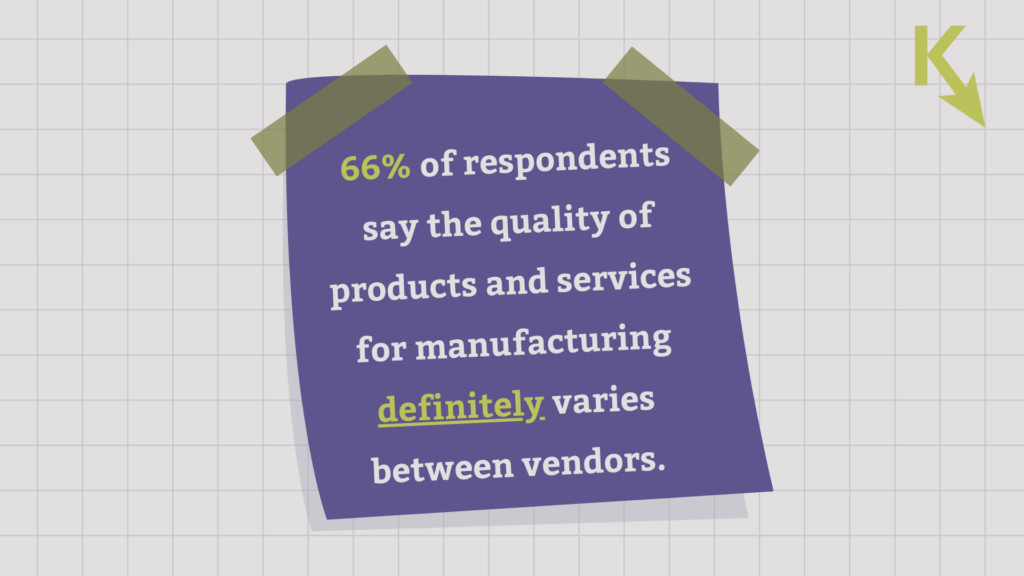
Sixty-six percent of respondents say the quality of products and services for manufacturing definitely varies between vendors.
Insights
Manufacturers have experienced a spectrum of quality from their vendors, and we know that quality is extremely important to them. The perception of significant variation in quality suggests a high level of competition for the product or service.
Because of manufacturers’ quality expectations and market competition, vendors must work hard to differentiate themselves.
Actions
Give manufacturers the information they need to confidently choose you. Use proof to establish trust in your quality: Testimonials, case studies, certifications, and quality assurance methods all demonstrate quality and carry more weight than words on your website.
Invest in research and development to enhance the performance, efficiency, and reliability of your own products and services. Educate yourself so you can stay on top of industry trends and emerging technologies to meet evolving customer demands And then share your story to show your innovation and evolution.
Though we like to think B2B buying decisions are made rationally based on data, that’s not the case: emotions play a role in B2B and B2C purchases. This is why trust and strong relationships are key. You can improve the quality of your deliverable and continue to build trust by working alongside your customers, being transparent, and having honest conversations.
Vendor Selection
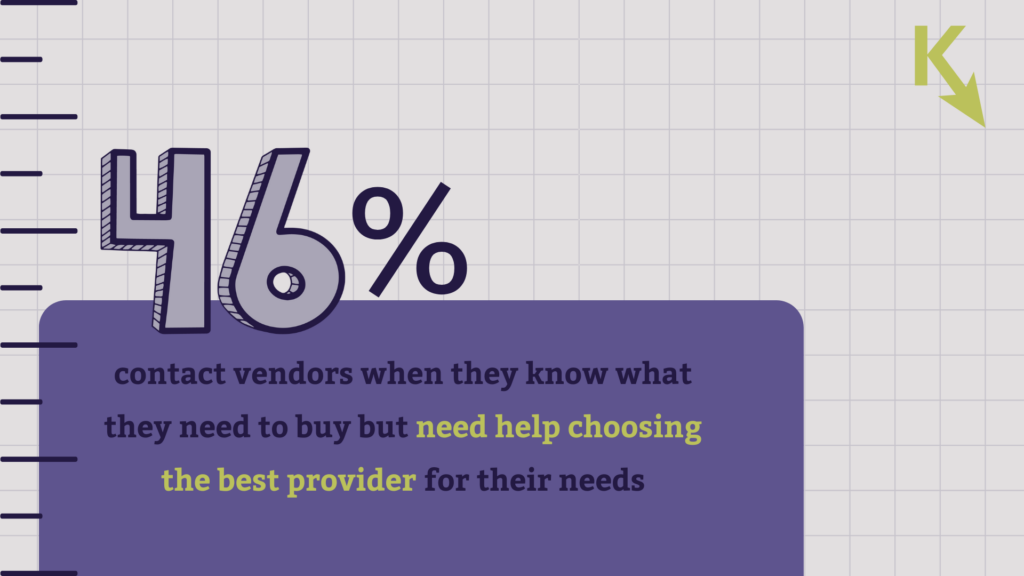
Forty-six percent of respondents contact vendors when they know what they need to buy but need help choosing the best provider for their needs.
Insights
When people go to Google, it’s because they have a challenge or a pain, but they don’t necessarily know that your product or service is the answer they’re seeking. Vendors and manufacturers alike should reflect their prospective customers’ pains back to them, show their understanding, and guide them to their solution.
Actions
To guide prospective customers along the customer journey and help them choose your solution, provide resources to educate them each step of the way. Examples of resources include blogs, videos, webinars, product demonstrations, and side-by-side comparisons. By taking a more consultative approach and focusing on adding value (and not going directly for the sale), you will showcase your expertise and positively differentiate yourself from your competitors. As you help them to make an intelligent buying decision by explaining their options, they will likely see that you are the option they want to move forward with.
Online Ordering
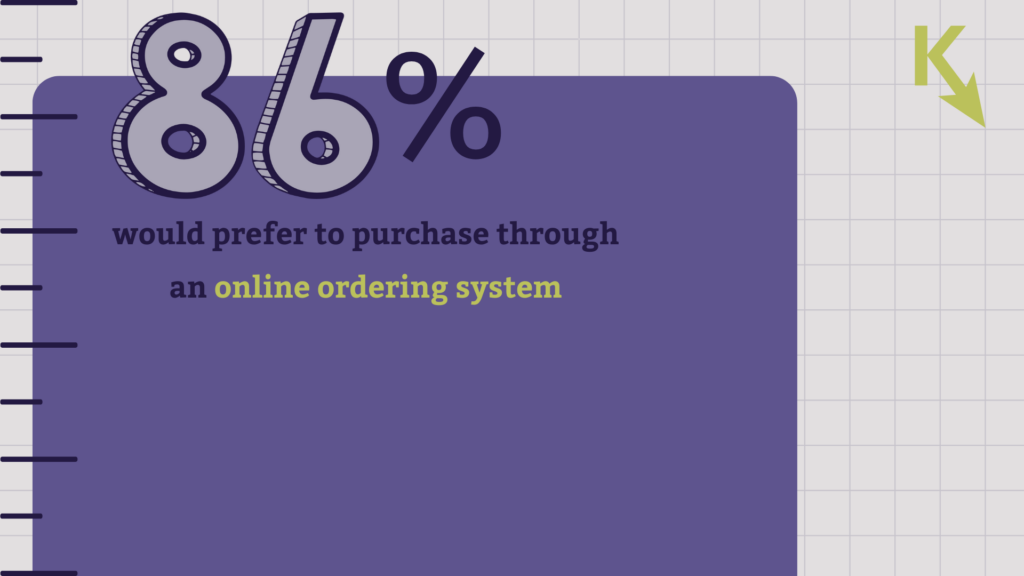
Eighty-six percent of respondents say they would prefer to purchase through an online ordering system. Because of the oftentimes custom nature of B2B purchases, this is a source of struggle for many B2B companies. A 2020 study from McKinsey & Company found that only 10 percent of industrial OEMs have online ordering systems in place.
Across industries, buyers are doing more research online before making purchasing decisions.
Having an online ordering system gives them another reason to choose you because you’re reducing the friction in the buying process for them.
Insights
Manufacturing buyers have a strong inclination towards digital procurement methods, likely driven by convenience, efficiency, and accessibility. Vendors who invest in user-friendly and efficient online ordering systems are likely to enhance customer satisfaction.
We’re accustomed to online ordering in our personal lives, and the expectations we have for consumer purchases are carrying over to B2B. Think about the rise of Amazon: it’s become a powerhouse because the platform makes buying easy and clearly communicates pricing and shipping information.
Actions
Regardless of whether you offer custom solutions, it is possible to enhance your customers’ buying experience by leaning into an online ordering system of some sort. Make it easy for potential customers to choose you: removing the friction from the purchasing process with a clean, user-friendly, intuitive system.
Putting the purchasing process in your customers’ hands frees you up to focus on the vendor/manufacturer relationship and being their trusted partner.
What Manufacturers Value About Their Vendors
Respondents were shown certain characteristics (all listed below) of a vendor of products and services for manufacturing. Then, they were asked to rank the importance of those characteristics as they pertain to choosing a vendor.
Vendor Characteristics
- Provides all documentation and paperwork to us if we are faced with a manufacturing issue
- Provides knowledgeable customer support when we need advice or help
- Provides easily accessible information, recommendations and resources for organizations like ours
- Provides innovative solutions
- Has been recommended by a respected expert in our industry
- Has been mentioned as a top provider in industry press
- Has a knowledgeable sales representative
- Has a friendly sales representative
- Has technical experts available for detailed support needs
- Is ISO-9000 certified
- Is based in my country
- Is a certified minority-owned business
- Is a certified woman-owned business
- Offers the lowest cost
- Responds quickly
- Familiar with our manufacturing process and equipment
- A company we trust
- Sponsors industry events
- High-quality products
- Close enough to visit our manufacturing facility when requested
Most Important Vendor Characteristics
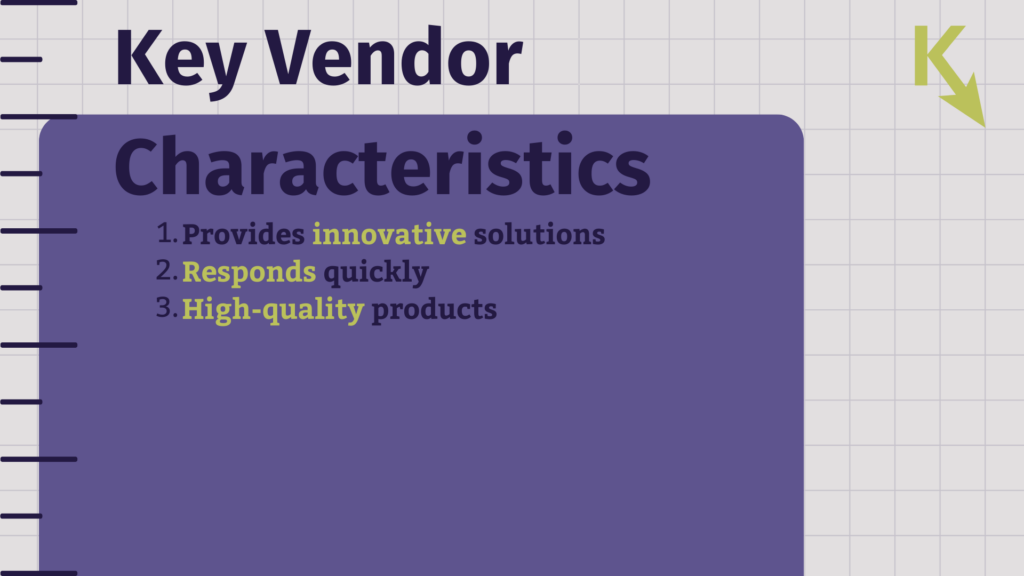
“Provides innovative solutions,” “Responds quickly”, and “High-quality products” were cited most often and cited significantly more than “Offers lowest cost.”
Least Important Vendor Characteristic
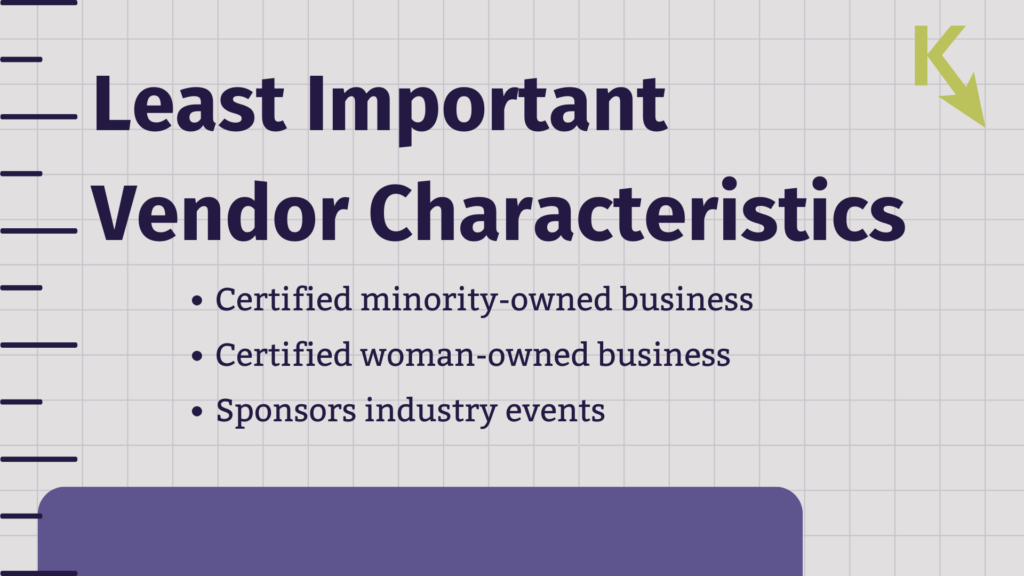
Cited by 15% or fewer respondents as important characteristics were “Certified minority-owned business,” “Certified woman-owned business,” and “Sponsors industry events.”
Insights
Quality and speed are more important than price.
There’s a need for cutting-edge technologies and forward-thinking approaches.
Effective communication and timely support are incredibly important.
Perceived differentiators have little impact on purchasing decisions. The characteristics cited as least important do not speak to your expertise, knowledge, trust, or customer support.
We had a client who had been in business for over 40 years; they believed the reason they had been in business for so long and had so much repeat business was because they were the lowest-cost provider. As we conducted our research, including conversations with customers, we learned they were not really the lowest-cost provider; their success was actually because their customer service team continued to bring ideas to the table.
Actions
Because quality and speed are of such high importance, it’s essential for vendors to streamline their processes to ensure quick turnaround time.
Deliver innovation – use your digital channels to showcase your technological advancements and forward-thinking approaches.
Establish clear and open lines of communication. Communicate proactively, not just reactively. Take advantage of digital tools such as AI chatbots to shorten customer response time and maintain consistent communication.
Conclusion
Our research has provided valuable insights into the challenges American manufacturers face and what they value most from their vendors. From supply chain issues to recruiting talented employees and maintaining profitability, manufacturers are navigating a complex landscape, and vendors play a crucial role in their success.
The data highlights the importance of quality, customer-centricity, and innovation in vendor relationships. Manufacturers expect vendors to understand their needs, offer quick responses, and deliver high-quality products and services. Building strong relationships based on trust and communication is essential for vendors to differentiate themselves and provide value beyond just the product or service itself.
As a strategic digital marketing agency, we can help you translate these insights into action. Whether it’s refining your messaging, improving your online presence, or developing targeted marketing strategies, we can assist you in better serving your manufacturing customers.
Reach out to us today to learn how we can help you leverage these insights and enhance your relationships with manufacturing clients.